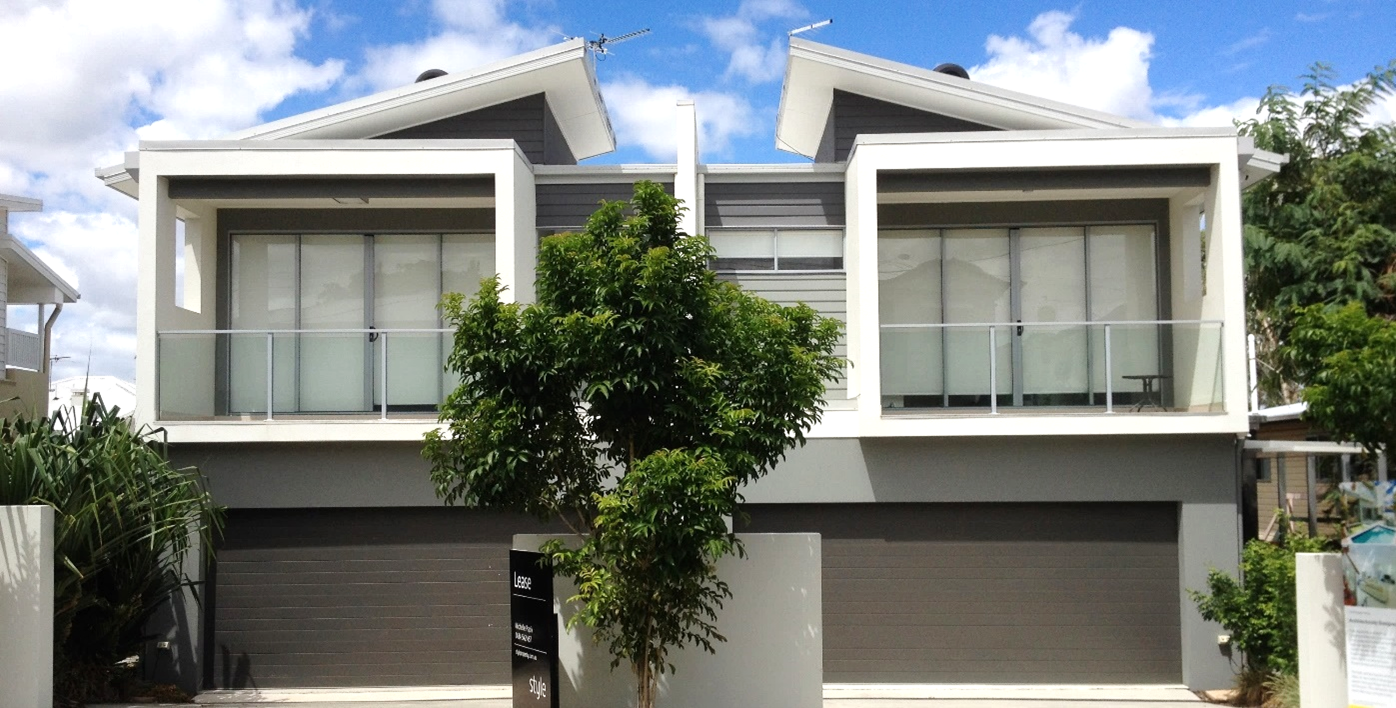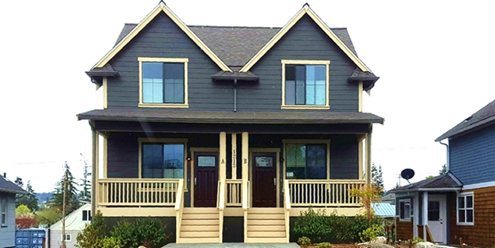
Got homeownership dreams? A duplex could be a way to break into today’s housing market. A duplex, of course, is a home property made up of two units. Typically, the two units share a wall but have separate entrances. So a duplex is essentially a house, divided into two homes.
With home prices as high as they are, many duplexes can and do offer accessible price points. But what’s the tradeoff?
As with any type of home property, a duplex comes with plus and minus factors. Let’s take a look.
A Duplex Is a Classic “Missing Middle” Home
If you’ve looked for starter homes recently, you know we’re down to slim pickings. A duplex deed represents the kind of ownership that’s filling in for the “missing middle” housing market. Much like backyard cottages or condo properties, duplexes can provide price relief when free-standing homes are just out of reach.
Here you might wonder: What sets a duplex apart from a condo? Both are less expensive alternatives to freestanding homes.
Generally, condo buildings have more than two units. The association holds the master deed, and owns the property that the buildings stand on. The condo deed gives the buyer full control over the inside of a unit only.
With a duplex you can own your piece of land, perhaps including a small back yard. Of course, that means you do all the yard work, too.
The duplex owner can acquire just one unit’s deed, or both deeds. Some buyers take title to both units, then live in Unit A, and rent out Unit B. The rental home works for the buyer, offsetting the surging costs of housing. It’s just one way hopeful buyers get the best of a mean market.
What About the Deed? (Or Is It Deeds?)

Duplex units are on one lot but have separate street numbers. These are different numbers, or different letters — A and B, usually.
Each has its own deed.
Each parcel is individually taxed.
The benefits of this setup?
If you’re buying one side of the building, you’re likely able to get a lower price than you’d pay for a freestanding house.
Or, you might be planning to purchase both housing units. That would mean acquiring two deeds through one transaction. And if you go to sell later, you’ll be able to list your properties separately.
Check out Deeds.com’s take on buying and selling a renter-occupied home.
And How Is the Duplex Financed?
If you’re just getting the deed to one unit, then the mortgage is straightforward. As long as one of the units will be your primary home, you may apply for a government-backed loan or a conventional loan. First-time buyers who haven’t had a chance to build up credit may find the FHA loan works. Some duplex buyers with modest incomes go with Freddie Mac’s Home Possible® loan.
Now, say you’d like to acquire both deeds and live in one unit while drawing income from renting the other one. You can ask the mortgage company to count up to 75% of your expected cash flows as income when applying for the mortgage, Experian explains. Expect to show that you have a renter waiting in the wings. Or at least be ready to obtain a professionally prepared rental income projection.
Rental income allows a deed holder to earn income and build equity. While you must declare the income to the IRS, there are also tax breaks for the costs of renting out the second unit (to a non-family member).
All things considered, buying a duplex is a relatively simple way to become an investor-owner. Financing an owner-occupied duplex means you just have to put 15% down. That’s an easy hurdle — compared to the 25% payment typical for investment properties.
So, Is There a Duplex Mortgage?
Here’s where a mortgage consultant can help. A pro can tell you the options, which might be:
- Two loans — and that’s two sets of closing costs. This is normal to do for two distinct property tax IDs. For a second mortgage, note that interest rates run .25-.5% higher.
- A portfolio loan. Some community banks and credit unions work with these. Again, higher fees and interest rates, along with stricter eligibility rules, apply.
- A single loan covering two units with separate deeds. Ask around with mortgage companies to see if this is possible in your case.
Needless to say, this can get much more complicated than acquiring a condo deed. Consult your financial advisor for guidance. For situation-specific legal matters, see a real estate attorney.
Thinking of Taking on Two Units? Check This List
Here are a few questions to ask yourself if you’re thinking about hacking into the real estate market with a duplex property:
- Do I have a renter lined up? Or do I know a real estate agent who can lay out data-informed income projections, and help me find a renter?
- Investment properties cost more to insure. Will insurance on the duplex be priced within my reach?
- Do I have guidance from a tax advisor, so I can maximize my deductions for mortgage interest, property taxes, and maintenance costs for the rental unit?
Using the duplex as your home and your investment property? You must rent it out at least 14 days in the year to deduct your costs for the rental unit.
- If I’m in the market for a duplex to share with family, do I have a plan to vest the deed for a multigenerational home?
- Am I clear on the deed covenants and restrictions that might affect my goals for the home? Do I understand taking title subject to covenants?
- Have I studied the city and county landlord laws and rules? Am I clear on city and township taxes?
- Have I considered forming a business to hold the duplex deeds? Have I discussed this with a licensed financial professional?
Yes, as always, this discussion is not financial or legal advice. For case-specific questions, you’ll need to consult local, licensed professionals. But we do hope this issue-spotting guide helps orient your thoughts about acquiring a duplex deed. It’s a flexible kind of investment that can support family or business goals. For some people, buying a duplex is the best of both worlds.
Supporting References
Tami Kamin Meyer for Bankrate Insight, by Bankrate, LLC, part of Red Ventures): What Is a Duplex? (Aug. 30, 2022).
Jordan Pandy, interviewing Dominique Raroha for Business Insider Newsletters via Insider.com: I Bought a Duplex as My First Home. I Still Have a Mortgage, But I Only Pay Around $900 a Month and Have No Regrets (Apr. 18, 2024).
Tim Maxwell for Ask Experian, from Experian.com: How To Buy a Duplex (Sep. 11, 2022).
Jim Kimmons for The Balance, part of Dotdash Meredith: What Is a Duplex Property? Definition & Examples of Duplex Properties (Nov. 1, 2020).
Deeds.com: House Hacking. It’s One Way to Buy, But Know the Risks (Apr. 11, 2022).
And as linked.
More on topics: Accessory dwelling units, House hacking
Photo credits: Kgbo / OpenStreetMap, licensed under CC BY SA 3.0 Unported, via Wikimedia Commons; and Sightline Institute Modest Middle Homes Library via Flickr, licensed under CC BY SA 4.0 Int’l.
